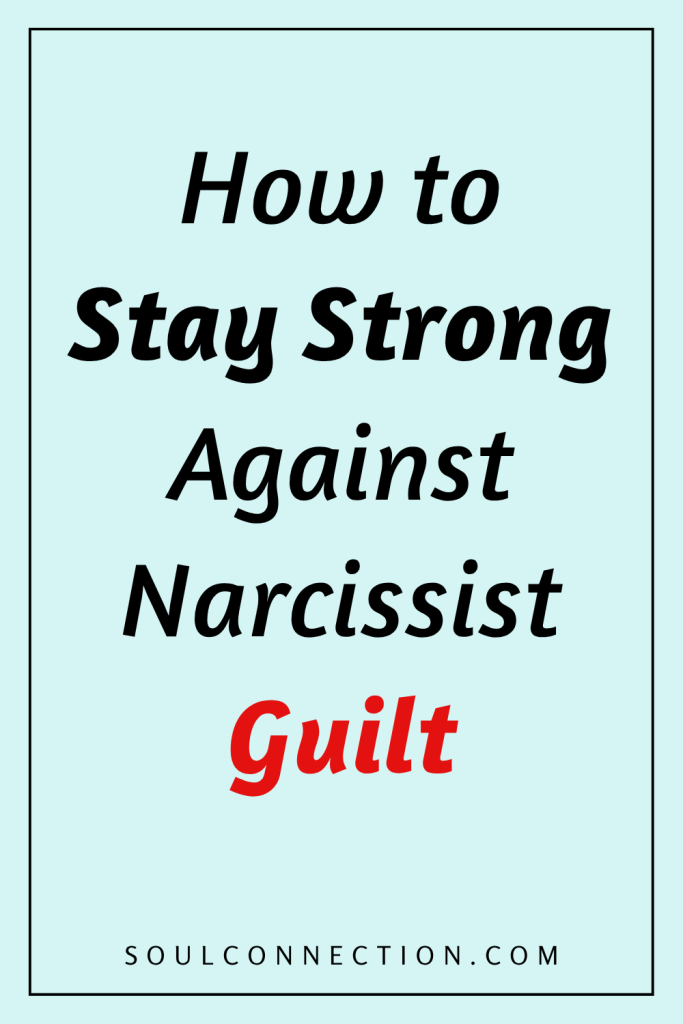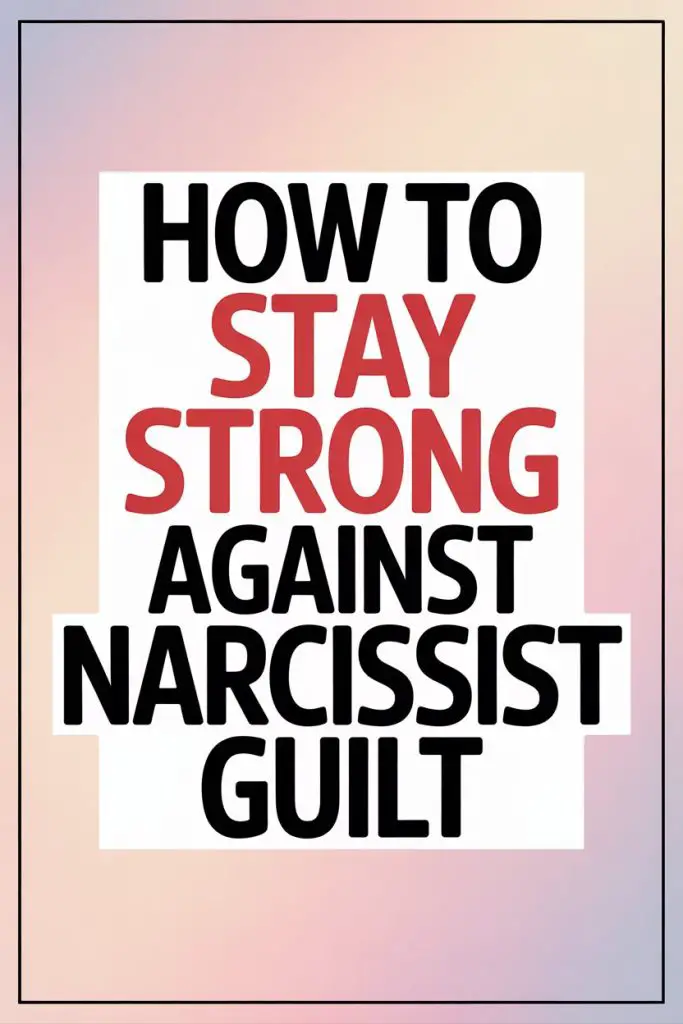Ever had that creeping feeling after talking to a certain someone—like maybe, just maybe, you’re a terrible person? Congratulations, you may have just encountered narcissist guilt.
It’s the emotional hangover that comes from trying to reason with someone who has turned finger-pointing into an Olympic sport.
If you’re tired of apologizing for things you didn’t do (or things no one sane would apologize for), let’s get down to business.
Spotting Guilt Trips Before You Board
People with narcissistic tendencies are world-class guilt trippers. They don’t just buy you a ticket—they shove you onto the train, wave you off, then act shocked you left the station.
Catching guilt trips early is half the battle. Notice the subtle phrases: “After everything I’ve done for you…” or “I guess I just care more than you do.”
These aren’t confessions of love. They’re booby-traps designed to make you question your own decency.
Next time you feel that familiar “ugh, am I the bad guy?” chill, pause. Ask yourself: Did I actually do something wrong, or is someone just handing me their emotional laundry?
Narcissist Logic: The Rules Make No Sense (And That’s the Point)
Ever try to play Monopoly with someone who makes up the rules as they go? Welcome to conflict with a narcissist.
Narcissists twist reality to suit their needs. Today, you’re selfish for setting boundaries. Tomorrow, you’re accused of not having any.
The goalposts move so fast, you need a GPS to find them.
Don’t waste hours hunting for logic in their accusations. Their rules shift for one reason: so you’ll always lose. Recognize it’s not about what you did, but about keeping you off balance.
Boundaries: Not Just for Toddlers
Most toddlers eventually learn “no” means “no.” Narcissists… not so much.
Strong, clear boundaries make guilt harder to weaponize. Decide what behaviors you won’t tolerate—gaslighting, blame-shifting, emotional ambushes at inconvenient times—and stick to it.
Expect pushback. Expect guilt bombs (“Wow, so you don’t care about my feelings at all!”) Don’t take the bait. A firm, “That doesn’t work for me,” said on repeat, works wonders. It’s like garlic to a vampire.
Let Yourself Off the Hook
Guilt is meant for real wrongdoing. Like borrowing your mate’s car and returning it with a new dent. Not for, say, spending an evening without constant texting, or skipping a dinner to rest.
Ask yourself: Did I break my own moral code? Or am I being measured by someone else’s impossible standards? If it’s the latter, give yourself a break.
No need to sign up for the guilt marathon.
Reality Checks: Your Sanity Lifeline
Gaslighting is the narcissist’s party trick. They’ll have you doubting your memory, your intentions, maybe even your own name. That’s where reality checks come in.
Keep a record—mental or otherwise.
After a blow-up, jot down what happened and how it made you feel. Compare notes with a friend who isn’t invested in the drama. Objectivity is your friend.
Sometimes, just telling your story out loud makes the manipulation plain as day. And you get the added benefit of seeing how truly bonkers the situation is when you say it out loud over coffee.
Emotional Detachment: Not Just for Robots
Narcissists thrive on emotional reactions. The more upset you get, the more they dig in.
Try visualizing their words bouncing right off you. Picture them as a carnival barker, shouting nonsense—entertaining, but not worth your time or ticket money.
Choosing not to engage emotionally isn’t cruel. It’s self-preservation. You don’t have to explain, defend, or justify yourself to someone determined to misunderstand you.
The Power of a Polite “No”
Politeness isn’t weakness (your gran was right). Combining civility with firmness is disarming. Narcissists expect either tears or an all-out brawl, not a calm refusal.
A simple, “I’m not able to do that,” delivered like you’re ordering a flat white, leaves them with nowhere to go. You’re not feeding the drama, and you’re not giving them ammunition for more guilt grenades.
Don’t Negotiate With Emotional Terrorists
Guilt is a favorite tool of emotional manipulators. The more you try to explain, the deeper you step into the quicksand.
Keep explanations brief and boring. A neutral, “I see it differently,” or “I’m not comfortable with that,” closes the debate. When you stop justifying, their arguments run out of steam.
(If only this worked with toddlers and bedtime.)
Self-Care: Not a Luxury, a Lifeline
Dealing with a narcissist drains the emotional tank faster than rush-hour traffic. If you’re running on fumes, guilt hits even harder.
Take care of yourself like you’d care for a best mate going through a breakup—sleep, eat, laugh, move your body. That’s not self-indulgence, that’s survival.
And, for goodness’ sake, remind yourself you’re not selfish for needing space. Recharging is necessary, especially when someone keeps trying to plug into your emotional socket without asking.
Support Squad: Gather Your Sanity Saviors
Isolation is a narcissist’s best friend. People who care about you aren’t easily fooled by their guilt games.
Reach out. Share what’s happening. Find those who remind you who you are and what you stand for—family, friends, a therapist, or your local dog-walking crew.
It’s easier to stand strong when you’re not standing alone. Plus, friends are great at calling out nonsense. (And, if nothing else, they’ll bring snacks.)
When Guilt Isn’t the Only Weapon
Sometimes, guilt is just the beginning. If you’re dealing with more than just emotional manipulation—think threats, harassment, or outright abuse—get help.
This goes beyond witty comebacks and healthy boundaries.
There’s no shame in reaching for professional support or calling in authorities if things escalate. Protecting yourself is not selfish or overreacting.
Rewriting Your Guilt Script
Guilt doesn’t have to run the show. It’s possible to rewire your inner dialogue so you’re less vulnerable to manipulation.
Affirmations aren’t just for Pinterest boards. Try: “My needs matter.” “I’m allowed to say no.” “I don’t have to own someone else’s feelings.” Lather, rinse, repeat.
With a little practice, those guilt arrows will start glancing off instead of sticking in.
Living Guilt-Free (Or, At Least, Guilt-Resistant)
Staying strong against narcissist guilt isn’t about turning into an unfeeling robot or winning every argument. It’s about reclaiming your right to your feelings, your boundaries, and your sanity.
Sure, guilt will sneak in from time to time. That’s normal. But next time someone tries to hand you a guilt trip, consider declining the invitation.
Your emotional passport is yours, and you get to decide where you travel.
No apologies required.


